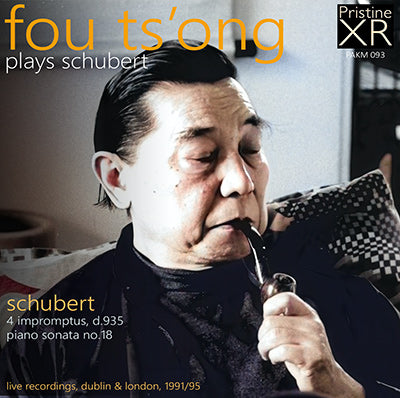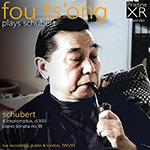
- Producer's Note
- Full Track Listing
- Cover Art
Fou Ts’ong plays Schubert, recordings from Dublin and London, 1991 and 1995
Fou Ts’ong spoke of Schubert in personal terms, even calling him “my friend”.
Great music not only transcends culture but bridges even the expanse of time. For the pianist from Shanghai, the Viennese composer inhabited all human experience, but with an intensely personal perspective where joy, friendship, disappointment in love, loss, loneliness and terror seamlessly dwell within a restrained classical structure. Lieder singing was the basis of his approach to Schubert’s piano music, whereby even figurations must have a melodic line, with Elizabeth Schumann and Gérard Souzay the singers who were his ideals. In conversation about Schubert it was the four-century poet Tao Yuanming 陶淵明 (365–427) that became the literary comparison this most widely cultured of artists drew on.
What did Fou Ts’ong mean? Perhaps a flavour comes from the poem ‘Ninth Day of the Ninth Month’, written in 409 AD:
From ancient times
there was none but had to die,
Remembering this
scorches my very heart.
What is there I can do
to assuage this mood?
Only enjoy myself
drinking my unstrained wine.
I do not know
about a thousand years,
Rather let me make
this morning last forever.
In Schubert’s work, there is happiness in the sharing of friendship and dance, the earthy intrusion of folk-rhythms, the supremacy of melody, the passing of time and joy, and moments where the reality of eternity illuminates darkness. But, in Fou Ts’ong’s playing, that darkness is very real. The composer’s life was indeed hard, with little recognition up to his very final years, the love of his life Caroline von Esterházy distant and an upbringing dominated by his father’s dour constriction of the family into a mould of joyless Catholicism. Even in Schubert’s death notice, at age 31, he felt it proper to announce in print that his son had received the Last Rites.
If there may be consolation in thoughts of immortality, there is an opposite here, always a threatening presence but perhaps showing its face most starkly in development section of the opening Molto moderato e cantabile movement of the G major sonata, D 894. With Beethoven, even in the darkest moments of Fidelio, hope never dissolves fully, and assertion is transformative, but in Schubert there can be an unrelieved blackness in that assertion, that life will end hopelessly and without redemption or purpose: perhaps a reaction to his father’s faith? Then there is loneliness, which for Fou Ts’ong was a driving force in the music, a sense that despite life’s friendships all would end and that in the darkness of rejection.
But, paradoxically, some of Schubert’s piano music seems of heavenly length, including the slow unfolding of D 894 here. After a performance of D 840 ( the sonata in C major), a friend remarked to Fou Ts’ong that Schubert seemed to be struggling to end the piece. He agreed, saying that there is a sense of cyclicality in Schubert's music, making the temporality seem infinite. He felt particularly that the parts of D 935 were more than a set of individual Impromptus; not a sonata, but in terms of key and theme relationships, a whole where each informed the meaning of the others. That onward sense of movement drives the F minor Allegro moderato, while the Ab Allegretto becomes a statement of deepest affection, with the Bb Andante variations variously colouring the ties that bind friends, while the return to F minor in the Allegro scherzando , far from playful despite the designation, becoming betimes under Fou Ts’ong’s hands a declaration of savage defiance.
Peter Charleton
FOU TS'ONG plays Schubert
SCHUBERT 4 Impromptus, D.935
1. 1. Allegro moderato (9:38)
2. 2. Allegretto (5:11)
3. 3. Theme and 5 Variations (10:11)
4. 4. Allegro scherzando (5:56)
Recorded live at the National Concert Hall, Dublin. 4 May, 1991
SCHUBERT Piano Sonata No. 18 in G major, D.894
5. 1st mvt. - Molto moderato e cantabile (17:20)
6. 2nd mvt. - Andante (7:43)
7. 3rd mvt. - Menuetto. Allegro moderato - Trio (4:20)
8. 4th mvt. - Allegretto (8:55)
Recorded live at Wigmore Hall, London, 12 March, 1995
Fou Ts'ong, piano
XR Remastered by
Cover artwork based on a photograph of Fou Ts-ong taken in London in 1998, courtesy Peter Charleton
Special thanks to Patsy Toh for permission to distribute these recordings, and to Peter Charleton for his invaluable help, guidance and supply of recorded and printed materials
Personal direction: Giovanna Horowitz
Original recordings engineered by Brian McIvor
Total duration: 69:14

